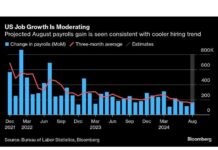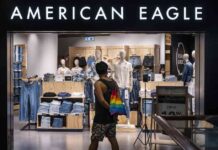Designer Michael Kors found himself in the spotlight on Monday as he testified in a federal courtroom about the challenges of staying relevant in the ever-evolving world of fashion. With brands rising and falling based on viral TikTok videos and celebrity endorsements, Kors reflected on the struggle faced by legacy brands like his own in maintaining consumer interest and loyalty.
Kors, who founded his eponymous brand in 1981 at the young age of 22 and still serves as its chief creative director, spoke candidly about the fluctuations in popularity that brands experience. “Sometimes you’ll be the hottest thing on the block,” he remarked. “Sometimes you’ll be lukewarm. Sometimes you’ll be cold.” This acknowledgment of the ebbs and flows of the fashion industry highlighted the need for constant adaptation and innovation to capture consumers’ attention.
The Federal Trade Commission’s antitrust trial in Manhattan, which aims to block Tapestry’s $8.5 billion acquisition of Capri, brought attention to the potential impact of consolidating six fashion brands under one company. The proposed merger would bring together Tapestry’s Coach, Kate Spade, and Stuart Weitzman with Capri’s Versace, Jimmy Choo, and Michael Kors. The FTC raised concerns about the power of a combined entity to raise prices for customers while offering the same or inferior products, particularly with Coach and Michael Kors under the same ownership.
As the trial unfolded, attorneys for Tapestry and Capri challenged the FTC’s portrayal of a consolidated handbag market. They argued that competition had intensified as consumers considered a wider range of brands, from luxury labels to fast-fashion names, and explored alternative shopping platforms such as online retailers and secondhand marketplaces. This evolving landscape underscored the need for brands to adapt to changing consumer preferences and behaviors.
Despite his brand’s storied history and success, Kors admitted to experiencing “brand fatigue” and recognized the need for a refresh to regain consumers’ interest. The shifting dynamics of the fashion industry, influenced by social media trends and celebrity endorsements, posed both challenges and opportunities for established brands like Michael Kors. Kors emphasized the importance of staying attuned to industry trends and consumer preferences to remain competitive in a rapidly changing market.
Subheadings:
Navigating the Evolving Fashion Landscape
Challenges and Opportunities in the Digital Age
Strategies for Staying Relevant in a Competitive Market
In a testimony that shed light on the impact of brand perception on retailers, former Macy’s CEO Jeff Gennette highlighted the consequences of relying heavily on a single brand like Michael Kors. Gennette revealed that Macy’s sales suffered as a result of the brand’s diminished appeal, leading to markdowns on Michael Kors’ handbags and contributing to a challenging period for the department store chain. This case study underscored the interconnectedness of brands and retailers in the fashion ecosystem, emphasizing the need for strategic partnerships and diversified offerings to mitigate risks.
The trial, set to conclude with testimony from economists representing both the FTC and the companies involved, reflected the broader challenges facing the fashion industry in a rapidly changing landscape. As consumers increasingly prioritize value, quality, and sustainability in their purchasing decisions, brands must adapt their strategies to meet evolving expectations. The outcome of the trial could have far-reaching implications for the future of the fashion market and the competitive dynamics among industry players.
As Michael Kors navigates the complexities of the modern fashion landscape, the designer remains committed to innovation and adaptation to meet the evolving needs of consumers. Drawing inspiration from interactions with customers, observations of industry trends, and insights from emerging brands, Kors continues to refine his brand’s offerings and strategies. In a market driven by creativity, authenticity, and consumer engagement, the ability to stay ahead of trends and anticipate shifts in consumer behavior will be critical for brands seeking to thrive in the TikTok and Taylor Swift era.






















